|
|
|
Sort Order |
|
|
|
Items / Page
|
|
|
|
|
|
|
| Srl | Item |
| 1 |
ID:
175816
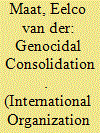

|
|
|
|
|
| Summary/Abstract |
Under conditions of guerrilla conflict, mass indiscriminate violence has been shown to effectively starve a guerrilla of its support. Consequently, counter-guerrilla mass violence is concentrated within territories where a guerrilla is dominant. However, in roughly 40 percent of mass violence episodes (e.g., Rwanda and Cambodia), the violence was aimed at populations within areas of secure territorial control. These episodes have therefore been explained by attributing ideological preferences to leaders or as unique cases only. I argue that leaders adopt mass indiscriminate violence against outgroups to consolidate power under conditions of elite rivalry. The violence serves two main goals. First, it helps build coalitions with constituencies that gain from violence; and second, it targets rival factions indirectly by forcing local security officials to facilitate or oppose the violence. The violence thereby provides rival supporters with an exit option, provides the regime with information on rival supporters’ private loyalties, and undermines rivals’ abilities to mount an effective resistance. These rivals can ultimately be purged from the regime. Based on newly collected original data on elite purges and on the type of mass indiscriminate violence for the years 1950 to 2004, I show that this type of mass violence, which I call “genocidal consolidation,” is intimately connected to authoritarian consolidation.
|
|
|
|
|
|
|
|
|
|
|
|
|
|
|
|
| 2 |
ID:
186593
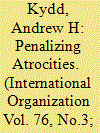

|
|
|
|
|
| Summary/Abstract |
The Syrian Civil War that began in 2011 killed more than 400,000 civilians. Could a limited intervention motivated by humanitarian concerns have reduced the death toll at an acceptable cost to the intervenors? I distinguish between two approaches to intervention: penalizing atrocities, by raising the cost and lowering the benefit of killing civilians; and fostering a balance of power, to convince the two sides that they cannot win on the battlefield and so must negotiate an end to the war. I show, using a game-theoretic model, that fostering a balance of power causes the government to commit more atrocities and prolongs the war. Penalizing atrocities, while it increases the likelihood of war, can reduce the expected level of atrocities. The model helps account for the failure of US efforts to promote negotiations by aiding Syrian rebels, and the success of efforts to deter Syrian chemical weapons use through threats and limited strikes.
|
|
|
|
|
|
|
|
|
|
|
|
|
|
|
|
| 3 |
ID:
092308
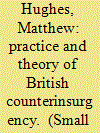

|
|
|
|
|
| Publication |
2009.
|
| Summary/Abstract |
This article details two largely unreported atrocities by British forces operating against Arab rebels during the Arab revolt, 1936-9, at the Palestinian villages of al-Bassa and Halhul. It then examines the military-legal system that underpinned and authorised British military forces operating in aid of the civil power, suggesting that the law in place at the time allowed for a level of reprisals and punitive actions, such as happened at al-Bassa and Halhul. The article does not conclude that the law allowed for atrocities but it does argue that it gave a basic form and understanding to an operational method that was brutal and could lead to atrocities. It thus tests the idea in much of the literature on counterinsurgency that the British were restrained and used minimum force when compared to other colonial and neo-colonial powers fighting insurgents.
|
|
|
|
|
|
|
|
|
|
|
|
|
|
|
|
| 4 |
ID:
083485
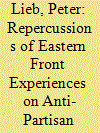

|
|
|
|
|
| Publication |
2008.
|
| Summary/Abstract |
In the long academic debate about the role of the Wehrmacht in anti-partisan warfare during World War II, the Western theatre of war in general and France in particular have been neglected. Having begun as a relatively moderate occupation with even some progressive methods, the German occupation policy radicalised in the last months before withdrawal began in August 1944. This article seeks to deliver explanations for this development. Special emphasis will be given on Eastern Front experiences and their effects on German behaviour in fighting the French resistance movement. It will be demonstrated that experiences from the Eastern Front did contribute considerably to the radicalisation in anti-partisan warfare in France in 1944. Moreover, other factors like elite identity of a unit, duration of deployment in anti-partisan warfare and especially Nazi ideology played an important role also.
|
|
|
|
|
|
|
|
|
|
|
|
|
|
|
|
| 5 |
ID:
075978
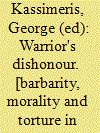

|
|
|
|
|
| Publication |
Aldershot, Ashgate Publishing Limited, 2006.
|
| Description |
ix, 243p.
|
| Standard Number |
0754647994
|
|
|
|
|
|
|
|
|
|
|
|
Copies: C:1/I:0,R:0,Q:0
Circulation
| Accession# | Call# | Current Location | Status | Policy | Location |
| 052193 | 303.66/KAS 052193 | Main | On Shelf | General | |
|
|
|
|
|
|
|
|
|